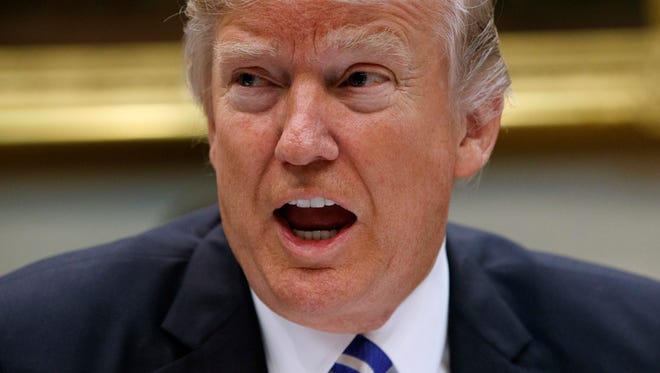Trump backtracks: U.S. will not withdraw from NAFTA

President Trump reversed course late Wednesday and said he had agreed to renegotiate rather than withdraw from the North American Free Trade Agreement with Mexico and Canada, a surprise announcement that came just hours after reports said he was considering an executive order to pull out of the trade pact and as his administration faces questions about what he has achieved in his first 100 days in office.
“It is my privilege to bring NAFTA up to date through renegotiation. It is an honor to deal with both President Peña Nieto and Prime Minister Trudeau, and I believe that the end result will make all three countries stronger and better," Trump said in a statement about his calls with the Mexican and Canadian leaders.
Early Thursday Trump added to that by appearing to claim the diplomatic upper-hand. In a tweet, the president said he "received calls from the President of Mexico and the Prime Minister of Canada asking to renegotiate NAFTA rather than terminate. I agreed ... subject to the fact that if we do not reach a fair deal for all, we will then terminate NAFTA. Relationships are good — deal very possible!"
Renegotiating or withdrawing from NAFTA, a decades-old trade deal that Trump has described as a "disaster" and says hurts U.S. workers, was one of the president's campaign pledges. Trump has already abandoned the Trans-Pacific Partnership, a 12-nation trade deal brokered by President Obama.
Mexico and Canada are the U.S.'s two largest export markets. NAFTA was established in 1994 to remove taxes on goods traded between the three countries. Pulling out of the pact would send the strongest signal yet from Trump that he intends to follow through on his vow to recast years of American economic policy.
The about-face followed a Politico report that said senior White House aides were drafting an executive order to withdraw from the pact, a move that drew immediate objections from some in Congress, including Sen. John McCain of Arizona.
“Withdrawing from #NAFTA would be a disaster for #Arizona jobs & economy,” he tweeted. “@POTUS shouldn’t abandon this vital trade agreement.”
“Scrapping Nafta would be a disastrously bad idea,” Sen. Ben Sasse of Nebraska said in a statement. “Yes, there are places where our agreements could be modernized, but here’s the bottom line: Trade lowers prices for American consumers, and it expands markets for American goods. Risking trade wars is reckless."
Since taking office Trump has repeatedly indicated he planned to either renegotiate or terminate NAFTA, which he and other critics blame for wiping out U.S. manufacturing jobs because it allowed companies to move factories to Mexico to take advantage of low-wage labor.
“I am very upset with NAFTA. I think NAFTA has been a catastrophic trade deal for the United States, trading agreement for the United States. It hurts us with Canada, and it hurts us with Mexico,” he said in an interview with the Associated Press last week.
The decision comes just days after the White House announced hefty new tariffs on softwood lumber from Canada and as Trump has labeled changes to Canadian milk product pricing that he says are hurting the American dairy industry a "disgrace."
The climbdown sent the Mexican peso and Canadian dollar higher against the U.S. dollar on Thursday.
In the event that Trump changes his mind, he could withdraw from NAFTA but he would have to give six months’ notice. It is unclear what would happen next.
Lawyers at international legal firm White & Case say the president's constitutional authority would likely permit him to withdraw from a U.S. trade agreement without seeking approval from Congress. However, he may still be forced to wrangle with lawmakers over putting tariffs on Mexican and Canadian imports.
It is also not clear what changes Trump will be seeking in the renegotiation.
In an eight-page draft letter to Congress seen by the AP, acting U.S. Trade Representative Stephen Vaughn wrote that the administration intended to start talking with Mexico and Canada about making changes to the pact, but the letter spelled out few details and stuck with broad principles.
Much of the existing agreement would remain in place, the letter showed, including private tribunals that allow companies to challenge national laws on the grounds that they inhibit trade. Critics say such provisions allows companies to get around environmental and labor laws.
During the campaign, Trump made 28 promises that he said would be achieved within his first 100 days in office, which he marks Saturday. The pledges were broad and covered constitutional amendments, regulations, trade, tax reform, health care and the military. A USA TODAY analysis found so far he has not achieved his goal.
Read more:
Trump soft pedals NAFTA criticism with Canadian PM, says Mexico the issue
Messing with Mexico is a dangerous idea: David Andelman
Trump addresses Republican lawmakers, vows to renegotiate NAFTA
Trump sprinting to 100th day deadline he scoffs
The first 100 days of the Trump presidency
